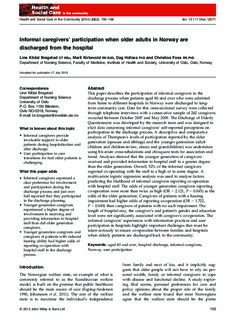| dc.contributor.author | Bragstad, L.K. | |
| dc.contributor.author | Kirkevold, M. | |
| dc.contributor.author | Hofoss, D. | |
| dc.contributor.author | Foss, C. | |
| dc.date.accessioned | 2018-02-19T10:00:24Z | |
| dc.date.available | 2018-02-19T10:00:24Z | |
| dc.date.issued | 2014 | |
| dc.identifier.citation | Bragstad, L. K., Kirkevold, M., Hofoss, D. & Foss, C. (2014). Informal caregivers’ participation when older adults in Norway are discharged from the hospital. Health and Social Care in the Community, 22(2), 155–168. | nb_NO |
| dc.identifier.uri | http://hdl.handle.net/11250/2485603 | |
| dc.description.abstract | This paper describes the participation of informal caregivers in the discharge process when patients aged 80 and over who were admitted from home to different hospitals in Norway were discharged to long-term community care. Data for this cross-sectional survey were collected through telephone interviews with a consecutive sample of 262 caregivers recruited between October 2007 and May 2009. The Discharge of Elderly Questionnaire was developed by the research team and was designed to elicit data concerning informal caregivers' self-reported perceptions on participation in the discharge process. A descriptive and comparative analysis of Thompson's levels of participation reported by the older generation (spouses and siblings) and the younger generation (adult children and children-in-law, nieces and grandchildren) was undertaken using bivariate cross-tabulations and chi-square tests for association and trend. Analyses showed that the younger generation of caregivers received and provided information to hospital staff to a greater degree than the older generation. Overall, 52% of the informal caregivers reported co-operating with the staff to a high or to some degree. A multivariate logistic regression analysis was used to analyse factors predicting the likelihood of informal caregivers reporting co-operation with hospital staff. The odds of younger generation caregivers reporting co-operation were more than twice as high (OR = 2.121, P = 0.045) as the odds of the older generation. Caregivers of patients with a hearing impairment had higher odds of reporting co-operation (OR = 1.722, P = 0.049) than caregivers of patients with no such impairment. The length of hospital stay, the caregiver's and patient's gender and education level were not significantly associated with caregiver's co-operation. The informal caregivers' experiences with information practices and user participation in hospitals highlight important challenges that must be taken seriously to ensure co-operation between families and hospitals when elderly patients are discharged back to the community. | nb_NO |
| dc.publisher | Health and Social Care in the Community | nb_NO |
| dc.subject | hospital discharge | nb_NO |
| dc.subject | elderly | nb_NO |
| dc.subject | informal caregivers | nb_NO |
| dc.subject | Norway | nb_NO |
| dc.subject | user participation | nb_NO |
| dc.title | Informal caregivers’ participation when older adults in Norway are discharged from the hospital | nb_NO |
| dc.type | Journal article | nb_NO |
| dc.source.pagenumber | 155-168 | nb_NO |
| dc.source.volume | 22 | nb_NO |
| dc.source.journal | Health and Social Care in the Community | nb_NO |
| dc.source.issue | 2 | nb_NO |
| dc.identifier.doi | 10.1111/hsc.12071 | |
